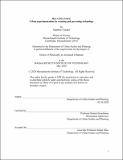How cities learn : urban experimentation for creating and governing technology
Author(s)
Claudel, Matthew(Matthew Christopher)
Download1193557266-MIT.pdf (58.86Mb)
Other Contributors
Massachusetts Institute of Technology. Department of Urban Studies and Planning.
Advisor
Dennis Frenchman.
Terms of use
Metadata
Show full item recordAbstract
As technologies become increasingly complex and embedded in cities, they are less and less intelligible with existing urban governance frameworks. In response, actors in cities around the world are taking up urban experimentation. The goal of this dissertation is twofold: to understand how urban experimentation enables actors to create and govern technology that generates civic value, and under what conditions it contributes to social, economic and political adaptation over time. This is a question of how cities learn. An urban experiment is an intervention with a sociotechnical system in the public realm. It is explicitly bounded in space and time, it involves groups of actors from different sectors, and its goal is to evaluate the intervention. I elaborate civic value as an evaluative lens, and turn to pragmatist and evolutionary theories of political epistemology to provide a theoretical foundation for understanding market and state adaptation as a collective learning process. The dissertation presents a body of empirical research: a nested case study of 12 urban experiments across three cities (Boston, Montreal, Amsterdam), two domains (real property, transportation), and several control regimes (from formal regulation to no control). I synthesize descriptive results at each of these levels, and find that urban experiments are typically structured as Partnerships, Sandboxes, or Exceptions. I then examine urban experiments through a theoretical lens. Actors in these cases have three different ways of thinking about how an experiment creates civic value. The first two -- performative and stochastic experimentation -- are prevalent, and they align with today's orthodox policy models. I find evidence that both can yield practical, short-term outcomes, in terms of creating technology or advancing regulation. However, there are critical conceptual faults related to uncertainty, power, and normalization. These experiments integrate sociotechnical systems only insofar as they fit existing urban governance frameworks. To some extent, these faults are resolved in a third approach -- emergent experimentation -- in which actors create and govern technologies in alternative (non-market, non-state) ways during the experiment. While the emergent approach is promising, the outcomes of an experiment are inevitably constrained to the narrow spectrum of organizational forms that are available in the market-state framework -- even if those conventional forms are ill-fit to sustain the civic value that emerged. No matter how inventive the experiment is, there remains a problem of stewarding civic value in perpetuity. I propose the civic corporation to fill that gap: a legal framework for new organization forms that have a duty to steward -- and perpetually rediscover -- civic value. In this way, emergent urban experimentation flows into ongoing structural adaptation. I argue that urban experimentation can become a technique for creating and governing technology in cities, if there exist stable but dynamic forms of distributed accountability and a structural capacity for learning with complex sociotechnical systems.
Description
Thesis: Ph. D., Massachusetts Institute of Technology, Department of Urban Studies and Planning, May, 2020 Cataloged from the official PDF of thesis. Includes bibliographical references.
Date issued
2020Department
Massachusetts Institute of Technology. Department of Urban Studies and PlanningPublisher
Massachusetts Institute of Technology
Keywords
Urban Studies and Planning.